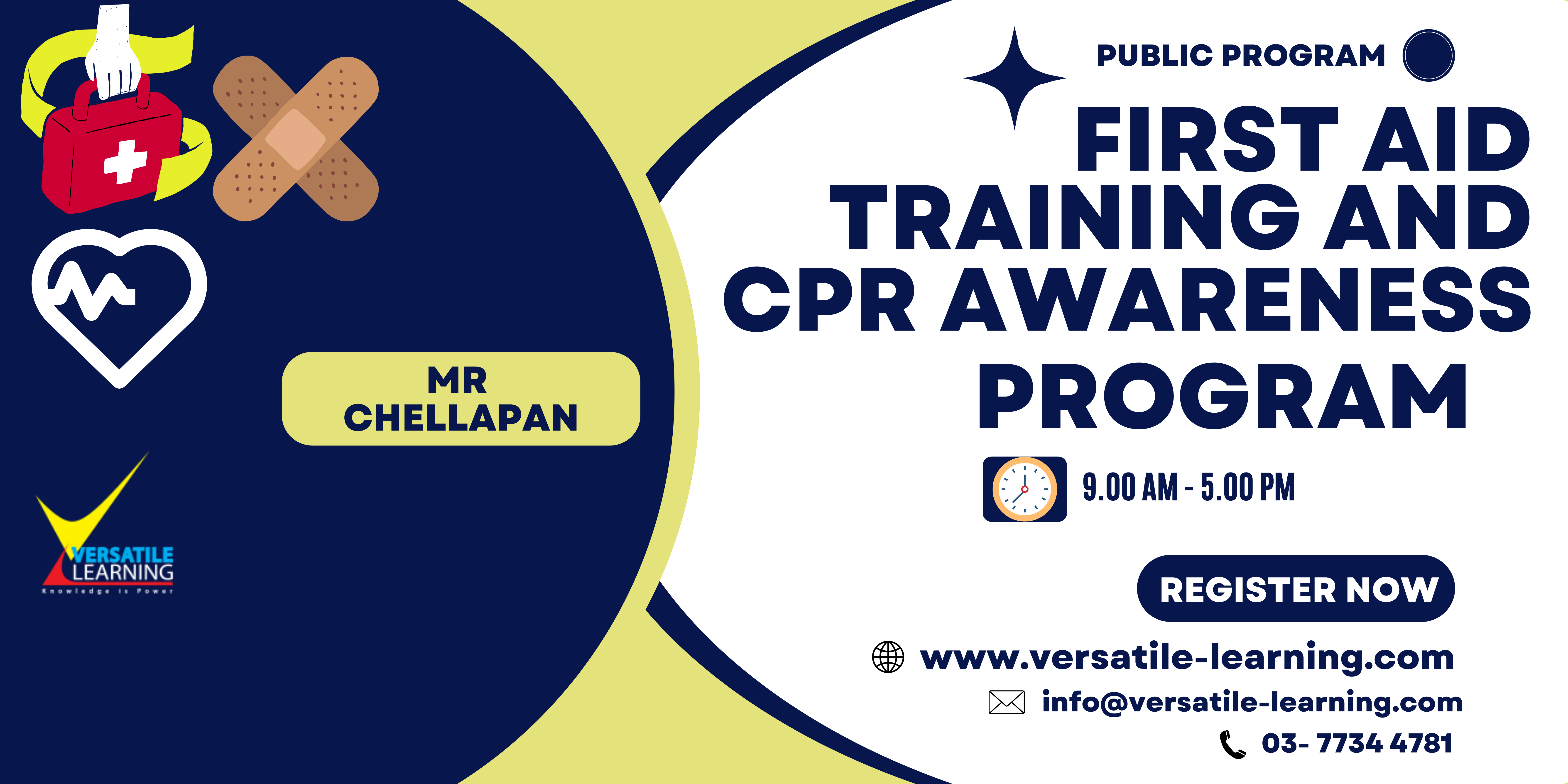First aid is the provision of initial care for an illness or injury. It is usually performed by non-expert, but trained personnel to a sick or injured person until definitive medical treatment can be accessed. Certain self-limiting illnesses or minor injuries may not require further medical care past the first aid intervention. It generally consists of a series of simple and in some cases, potentially life-saving techniques that an individual can be trained to perform with minimal equipment
FAD 001 – First Aid Training and CPR Awareness Program, 25 & 26 September 2024
FAD 001 – First Aid Training and CPR Awareness Program, 25 & 26 September 2024
RM 1,990.00
RM 1,990.00
| Duration: 2 days |
| Lectures: De Palma Hotel |
| Certificate of Completion |
INTRODUCTION
OBJECTIVES
At the end of this training session, among others, participants will be able to:
- To equip the participants with the necessary skills and knowledge to handle medical emergencies in an Office / Factory environment
- To have the latest updates / know how to perform Resuscitation procedures for victims of Cardiac and Respiratory arrests
- To enable participants to competently and confidently deal with both major and minor injuries
WHO SHOULD ATTEND?
All employees who needs to learn about first aid and CPR to save lifes.
METHODOLOGY
- Theory and practical session
- Video aid
- Group discussion
- Group task
- Case study
Full Training content is restricted to members only. Please log in to view more details. Registration are Free!
Day One (9am - 5pm)
- Objective of First Aid
- Primary and Secondary Survey
- Scene survey and Danger Assessment
- Aids to Diagnosis- Principles of Sight, Hearing, Smell and Touch
- Diagnostic signs / Symptoms
- First Aid Guidelines
- Acts / Legal Provisions on First Aid facilities
- First Aid box contents and it’s uses
- Anatomy and functions of Lungs
- How the Lungs work
- Breathing process (Mechanism of breathing)
- Composition of Air and Breathing rate
- Respiratory Diseases and Emergency Management
- Anatomy and Physiology of the Heart
- Types of Circulation
- Nerve Impulse and Blood Pressure
- Types of Blood Vessels and characteristics
- Blood and contents
- Coronary Artery Diseases
- Prudent Heart Living – A Healthy Lifestyle
- Risk Factors
- Signals of Heart Attack
- Actions For Survival
- Stroke and Emergency Management
Day Two (9am - 5pm)
- Definition and causes of Shock
- Types of Shock
- Signs and Symptoms and Management of Shock
- Fainting / Unconscious Management
- Causes, Types, and Degrees of Severity
- Treatment using Principles of 3 Cs – Cool, Cover & Carry
- Emergency Treatment for Chemical Burns
- Chemical Burns & Chemical Injuries
- Types of Chemicals and the Importance of Proper Handling Procedures/PPE
- Treatment for Accidental Ingestion of Chemicals
- Treatment for Chemical Burns & Exposure to Corrosive Chemicals
- Determination of Partial or Complete Airway Obstruction
- Universal Sign of Airway Obstruction
- Heimlich Manoeuvre in a Conscious / Unconscious Victim
- Management of Airway Obstruction in Infant, Child and Adult
- Management of Airway Obstruction in a Pregnant Woman or Obese Victim
- Simple closed fracture and a more serious open fracture
- Types of Fractures and their Causes
- Signs and Symptoms
- Importance of Distal Pulse Checks and Neuro Vascular Compromise
- Spinal Injuries and the management
- Immobilisation and Splinting of :
1. Jaw Fracture or Dislocation
2. Ribs Fracture
3. Upper Limbs and Collar Bone Fractures
4. Lower Limbs Fractures
5. Pelvic Bone Fracture
6. Fractures Involving Joints - Injuries to Joints / Muscles and Management
- Application of splints / Air Splints and other Fracture Aids
About Instructors
RM 1,990.00
| Duration: 2 days |
| Lectures: De Palma Hotel |
| Certificate of Completion |

